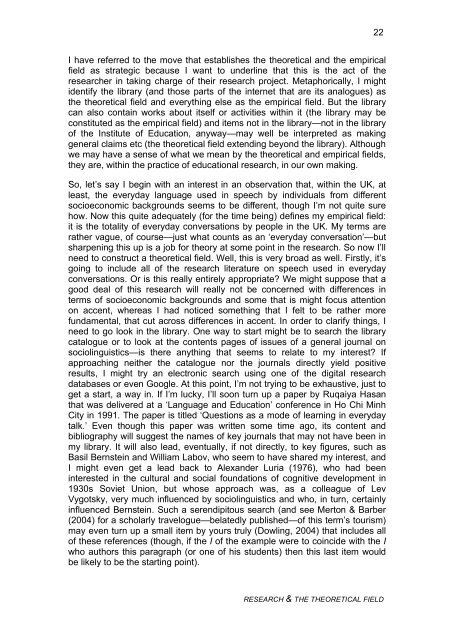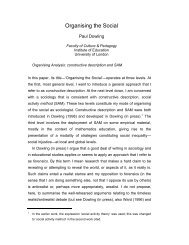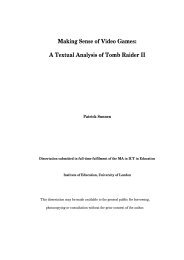Research and the Theoretical Field - Pauldowling.me
Research and the Theoretical Field - Pauldowling.me
Research and the Theoretical Field - Pauldowling.me
Create successful ePaper yourself
Turn your PDF publications into a flip-book with our unique Google optimized e-Paper software.
22<br />
I have referred to <strong>the</strong> move that establishes <strong>the</strong> <strong>the</strong>oretical <strong>and</strong> <strong>the</strong> empirical<br />
field as strategic because I want to underline that this is <strong>the</strong> act of <strong>the</strong><br />
researcher in taking charge of <strong>the</strong>ir research project. Metaphorically, I might<br />
identify <strong>the</strong> library (<strong>and</strong> those parts of <strong>the</strong> internet that are its analogues) as<br />
<strong>the</strong> <strong>the</strong>oretical field <strong>and</strong> everything else as <strong>the</strong> empirical field. But <strong>the</strong> library<br />
can also contain works about itself or activities within it (<strong>the</strong> library may be<br />
constituted as <strong>the</strong> empirical field) <strong>and</strong> items not in <strong>the</strong> library—not in <strong>the</strong> library<br />
of <strong>the</strong> Institute of Education, anyway—may well be interpreted as making<br />
general claims etc (<strong>the</strong> <strong>the</strong>oretical field extending beyond <strong>the</strong> library). Although<br />
we may have a sense of what we <strong>me</strong>an by <strong>the</strong> <strong>the</strong>oretical <strong>and</strong> empirical fields,<br />
<strong>the</strong>y are, within <strong>the</strong> practice of educational research, in our own making.<br />
So, let’s say I begin with an interest in an observation that, within <strong>the</strong> UK, at<br />
least, <strong>the</strong> everyday language used in speech by individuals from different<br />
socioeconomic backgrounds seems to be different, though I’m not quite sure<br />
how. Now this quite adequately (for <strong>the</strong> ti<strong>me</strong> being) defines my empirical field:<br />
it is <strong>the</strong> totality of everyday conversations by people in <strong>the</strong> UK. My terms are<br />
ra<strong>the</strong>r vague, of course—just what counts as an ‘everyday conversation’—but<br />
sharpening this up is a job for <strong>the</strong>ory at so<strong>me</strong> point in <strong>the</strong> research. So now I’ll<br />
need to construct a <strong>the</strong>oretical field. Well, this is very broad as well. Firstly, it’s<br />
going to include all of <strong>the</strong> research literature on speech used in everyday<br />
conversations. Or is this really entirely appropriate We might suppose that a<br />
good deal of this research will really not be concerned with differences in<br />
terms of socioeconomic backgrounds <strong>and</strong> so<strong>me</strong> that is might focus attention<br />
on accent, whereas I had noticed so<strong>me</strong>thing that I felt to be ra<strong>the</strong>r more<br />
funda<strong>me</strong>ntal, that cut across differences in accent. In order to clarify things, I<br />
need to go look in <strong>the</strong> library. One way to start might be to search <strong>the</strong> library<br />
catalogue or to look at <strong>the</strong> contents pages of issues of a general journal on<br />
sociolinguistics—is <strong>the</strong>re anything that seems to relate to my interest If<br />
approaching nei<strong>the</strong>r <strong>the</strong> catalogue nor <strong>the</strong> journals directly yield positive<br />
results, I might try an electronic search using one of <strong>the</strong> digital research<br />
databases or even Google. At this point, I’m not trying to be exhaustive, just to<br />
get a start, a way in. If I’m lucky, I’ll soon turn up a paper by Ruqaiya Hasan<br />
that was delivered at a ‘Language <strong>and</strong> Education’ conference in Ho Chi Minh<br />
City in 1991. The paper is titled ‘Questions as a mode of learning in everyday<br />
talk.’ Even though this paper was written so<strong>me</strong> ti<strong>me</strong> ago, its content <strong>and</strong><br />
bibliography will suggest <strong>the</strong> na<strong>me</strong>s of key journals that may not have been in<br />
my library. It will also lead, eventually, if not directly, to key figures, such as<br />
Basil Bernstein <strong>and</strong> William Labov, who seem to have shared my interest, <strong>and</strong><br />
I might even get a lead back to Alex<strong>and</strong>er Luria (1976), who had been<br />
interested in <strong>the</strong> cultural <strong>and</strong> social foundations of cognitive develop<strong>me</strong>nt in<br />
1930s Soviet Union, but whose approach was, as a colleague of Lev<br />
Vygotsky, very much influenced by sociolinguistics <strong>and</strong> who, in turn, certainly<br />
influenced Bernstein. Such a serendipitous search (<strong>and</strong> see Merton & Barber<br />
(2004) for a scholarly travelogue—belatedly published—of this term’s tourism)<br />
may even turn up a small item by yours truly (Dowling, 2004) that includes all<br />
of <strong>the</strong>se references (though, if <strong>the</strong> I of <strong>the</strong> example were to coincide with <strong>the</strong> I<br />
who authors this paragraph (or one of his students) <strong>the</strong>n this last item would<br />
be likely to be <strong>the</strong> starting point).<br />
RESEARCH & THE THEORETICAL FIELD




